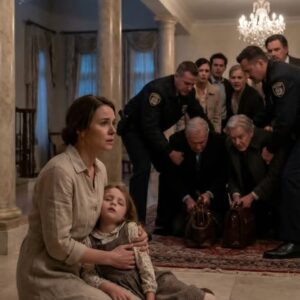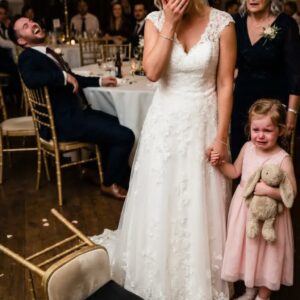My name is Marilyn Brooks. I am sixty-eight years old, and exactly three days after I watched my husband’s casket lowered into the earth, his boss called me. It was a voice that cut right through the thick fog of my grief, sharp and startling.
— Ma’am — he said, his tone leaving no room for pleasantries — I found something. I need you to come to my office immediately. And please, Marilyn, do not tell your son or your daughter-in-law. You could be in danger.
His words froze me where I sat. I was still perched on the edge of the sofa in the living room, surrounded by a sea of sympathy cards and vases of half-wilted lilies, still trying to force my mind to accept that Edward was truly gone. The phone felt incredibly heavy in my hand, as if the call itself bore a physical weight I wasn’t strong enough to carry. A small, desperate part of me wanted to dismiss it. I wanted to believe this was just administrative bureaucracy—a forgotten insurance form, perhaps, or a missing signature on a pension document.
But deep inside, beneath the numbness, something dormant began to stir. A quiet, expanding pressure in my chest. It was an instinct I couldn’t quite name, a warning bell ringing in the distance.
Franklin Cole, the CEO of Northbridge Capital, did not sound like a man calling to offer condolences. There was a frantic urgency in every syllable, a taut vibration of tension he couldn’t mask. And when he told me that Edward had left explicit, strict instructions for him to speak only to me, my heart hammered against my ribs.
Only to me. Why would Edward leave a message that deliberately excluded Jason and Tessa? Why would a man who had spent his life keeping our family woven tight suddenly manufacture a secret that involved the word “danger”? I had no answers. All I had was a growing, gnawing uneasiness that made it difficult to draw a full breath.
I agreed to meet Franklin the following morning. After I placed the receiver back on the cradle, the house seemed to drop in temperature. It felt colder, almost alien to me. I glanced at the framed photograph of Edward resting on the mantle.
In the dim evening light, his smile seemed almost animate, calm and steady, refusing to fade into the dark even though he was no longer here to smile at me. For a fleeting heartbeat—just a single, fragile second—I let myself believe he was trying to reach out. I imagined he was trying to warn me, telling me to open my eyes, whispering that the ground beneath my feet was not as solid as I thought. So, stay with me. When you reach the end of this account, tell me which city you are watching from.
I need to know how far this story travels, and who bears witness to what happened next.
The morning of Edward’s funeral was the precise moment I first sensed that the tectonic plates of my life had shifted in a way I couldn’t yet articulate. The church in our quiet, leafy Ohio neighborhood had been packed to the rafters.
Former colleagues, kind-hearted neighbors, distant cousins—they had all gathered to honor the man I had walked beside for forty-five years. Yet, as I sat alone in the front pew, draped in black, it felt as though the center of gravity had moved. Instead of gravitating toward me, the widow, the mourners drifted toward our son, Jason, and his wife, Tessa.
They absorbed every condolence, organized the logistics of the service, and answered inquiries with a calm, terrifying authority. They acted as if they were the ones who had lost a spouse. More than once, I overheard Jason’s voice, carefully modulated and controlled, drifting through the air.
— Mom just needs to rest — he would say. — We are handling everything.
The tone was gentle, yes, but there was an unmistakable, serrated edge of condescension hidden within it. It was as though I had suddenly become incapable of standing on my own two feet. Tessa, always so polished and gracious on the surface, wore a mask of concern that felt rehearsed, like a scene from a play. She leaned in close to a neighbor, her voice a stage whisper.
— Marilyn is very fragile right now — she said. — Jason and I are taking good care of her.
It was as if my grief had somehow erased my competence. As if becoming a widow had reverted me to the status of a child. I folded my hands tightly in my lap until the knuckles turned white, not because I agreed with them, but because I simply didn’t have the energy to fight back. The crushing weight of Edward’s absence pressed too heavily against my lungs for me to challenge the narrative they were spinning about my role in my own life. Edward had always viewed me as his equal, his partner in everything. But over the last five years, especially since Jason had married Tessa, the dynamic had warped.
Their tone when speaking to me had changed. It was softer on the surface, but hollow underneath—a brand of kindness that bordered on control, a smile that concealed something I wasn’t yet meant to see. “Fragile.” That word reverberated through the church nave, louder than the choir’s hymns.
It clung to me, pressing into my psyche like a label I had never consented to wear. I didn’t realize it then, but that word was the first loose thread in a much larger, catastrophic unraveling.
After the service concluded and the mourners slowly drifted out of our home, I retreated to my favorite armchair by the bay window. The living room still held the heavy scent of tuna casseroles and cloying perfume from the visitors, but without Edward, it felt painfully, hollowly empty. I was exhausted in a way that went beyond physical tiredness, yet Jason and Tessa seemed possessed by a restless, vibrating energy. They moved through my home as if they already held the deed.
Tessa was the first to make a move. She approached me holding a cup of herbal tea I hadn’t asked for.
— Marilyn — she said, her voice thick with that practiced, sickening sympathy — you should go lie down. It has been such a hard day for you.
The way she spoke made me feel microscopic, as if she were addressing someone too senile to comprehend basic instructions.
— I am fine right where I am — I told her, though my voice emerged thinner and weaker than I had intended.
That was all the opening Jason needed. He sat in the chair opposite me, folded his hands, and leaned forward like a physician delivering a terminal diagnosis.
— Mom — he began — Tessa and I have been talking. We really don’t think you should stay in this house alone. It’s too big. There are too many risks. What if you fall? What if something happens?
He exchanged a quick, meaningful glance with Tessa, and I felt a cold spiderwalk of fear crawl up my spine.
— What do you mean? — I asked, though a leaden weight was already sinking in my stomach.
Jason took a deep breath, preparing his pitch.
— There are some very nice senior living communities — he said. — Safe places. Good staff. People your own age. Activities. You wouldn’t be lonely there.
Senior living. I felt the words land like stones inside me. Tessa stepped closer, eager to reinforce the trap.
— It is not a nursing home — she added quickly. — They are beautiful places, Marilyn. You deserve comfort and care.
— This is my home — I almost whispered.
But even to my own ears, the protest sounded fragile, as if I were trying to convince myself more than them. Before the interrogation could continue, the phone rang in the kitchen. Jason sprang up to answer it. His voice dropped low, a mumble of hushed tones, but I caught the cadence of secrecy. When he returned, his expression had tightened into a knot.
— That was someone from Dad’s office — he said, his eyes shifting away from mine. — They wanted to talk to you about some paperwork.
— What paperwork? — I asked.
Jason shrugged, a gesture of casual dismissal.
— Nothing for you to worry about. I told them anything important should go through me.
It was the first moment a sharp, instinctive alarm flickered in my chest. Something was wrong. Fundamentally wrong. And for the first time, I was beginning to truly feel it.
The next morning, I woke with a sense of clarity and purpose I hadn’t felt since the moment Edward’s heart stopped. Something primal inside me insisted that I go to Franklin Cole’s office, regardless of what Jason or Tessa thought I should or should not do. I dressed with meticulous care, choosing the navy blazer Edward always said made me look strong, capable.
For the first time in days, staring in the mirror, I felt like myself again.
Jason called early, just as he had every single morning since the funeral.
— How did you sleep, Mom? — he asked. — Maybe you should come stay with us for a few days. Tessa can help you with things around the house.
— I need to go out — I told him, cutting off his offer.
There was a short, loaded pause on the line.
— Go out where? — he asked, his tone sharpening.
I spoke quickly, the lie forming instantly on my tongue.
— The pharmacy. I ran out of my blood pressure pills.
— I can bring them to you — he insisted immediately. — You don’t need to drive anywhere.
That familiar tightness squeezed my chest, the walls closing in.
— I can drive myself — I told him, keeping my voice gentle but firm.
He sighed, a long, irritated sound that crackled through the receiver.
— Fine. Just call me if you need anything.
I drove downtown, gripping the steering wheel a little harder than usual, my knuckles white. The twenty-story glass tower of Northbridge Capital reflected the morning sun, looking sharp, cold, and imposing. Edward had worked inside that monolith for thirty years, yet I had only ever seen the lobby once or twice. Today, however, I was escorted straight to the executive floor, a sanctuary of power I had never been invited to before.
When I entered Franklin Cole’s office, the first thing that struck me was the view. Floor-to-ceiling windows overlooked the sprawling city, the skyline stretching out like a map of a life I didn’t know my husband carried burdens within. Franklin stood to greet me.
He was a tall man in his fifties, with perfectly coiffed silver hair and the kind of tailored suit that made him look permanently composed. But today, his eyes held something close to worry.
— Mrs. Brooks, thank you for coming — he said. — Please, have a seat.
I sat across from his massive desk, feeling small and out of place among the polished mahogany and the quiet hum of corporate power that filled the room. Franklin began slowly, choosing each word with agonizing care.
— First, I want you to know that Edward was one of our most respected employees — he said. — He was loyal, careful, and honest. So when he came to me six months ago with concerns, I took them very seriously.
He walked to a heavy metal file cabinet, unlocked it with a small key, and returned with a thick, beige folder. He placed it in front of me. The thud it made against the wood echoed in the silence. The weight of it alone made my heart pound against my ribs.
— Edward came to see me several times in the last few months of his life — Franklin said. — He told me he was worried. Not about work. But about family matters.
I stared at the folder, unable to make my fingers move to open it.
— Family — I whispered. The word suddenly felt dangerous, like a weapon.
Franklin reached out and opened the folder, turning it toward me.
It was filled with pages and pages of handwritten notes. Dates, times, transcribed conversations, photocopies of financial documents, and even printed photos that I did not yet understand.
— Your husband believed Jason and Tessa were trying to pressure him into signing legal papers — Franklin said quietly. — Papers that would give them total control over your finances and medical decisions if something happened to him.
My breath caught in my throat, a jagged intake of air. I shook my head slowly, trying to deny it, but a cold dread began to settle deep in the pit of my stomach like lead. Franklin rested one hand gently on the edge of the folder.
— Mrs. Brooks, Edward didn’t want to worry you until he was sure. And he was sure. He found proof that something was very, very wrong.
I finally reached out and touched the edge of the first page. That moment was the beginning of the truth unraveling. I had barely begun reading the first few lines when a sharp, aggressive knock rattled the heavy office door.
Franklin’s eyes flicked toward the sound with a tension I did not understand. Before he could even respond, the door swung open.
Jason and Tessa stood in the doorway.
For a heartbeat, none of us spoke. The air left the room. Jason’s expression held something between blinding anger and genuine shock, while Tessa wore that same careful, porcelain smile she used whenever she wanted to appear harmless. But there was nothing harmless about the way they stepped into the room, claiming the space.
— Mom — Jason said slowly, his voice dropping an octave. — What are you doing here?
His tone wasn’t surprised; it was accusatory. It sounded as though I had committed a crime simply by being somewhere without his permission.
— We were so worried when you weren’t at home — Tessa added quickly, stepping up beside him. — You should have told us where you were going. We just want to help you.
— You should not be making decisions alone — Jason continued, his eyes darting to the folder on Franklin’s desk as if he wanted to lunge across and snatch it away.
Franklin stood up, his shoulders squared, radiating authority.
— This is a private meeting — he said calmly. — I need to ask you both to step outside immediately.
Tessa let out a soft, dismissive laugh.
— With all due respect, Mr. Cole — she said — Marilyn is grieving. She is not in the right state of mind for serious conversations. She needs family supervision.
Her words felt like a physical slap across my face.
— I am sixty-eight, not six — I said, but I hated that my voice trembled when I said it.
Jason frowned at me, looking at me with the disappointment one reserves for a disobedient toddler.
— Mom, you are vulnerable right now — he said. — Dad’s gone. We need to protect you from people who might manipulate you.
Manipulate. The irony nearly choked me. Something inside me shifted then—a quiet, rising tide of anger that burned hotter than the grief. Franklin gently touched my arm.
— Mrs. Brooks, may I speak with you outside for a moment?
I shook my head firmly.
— No — I said, finding my voice. — Let’s talk here. With everyone present.
Jason’s gaze darted to the open folder again, panic flickering behind his eyes.
— What did he show you? — he demanded. — Nothing important, right? You know how people exaggerate when money is involved.
— Money — I repeated. The way he said it made something click in my mind like a lock tumbling into place. — How do you know about your father’s finances? How do you know about his insurance? His savings?
Tessa’s smile faltered for the first time.
— We just assumed — she whispered.
But Jason’s jaw tightened, a muscle feathering in his cheek.
— Dad mentioned it a few months ago — he said. — He told us he wanted to make sure you were taken care of, if something happened.
— Funny — I replied softly, staring him down. — He never mentioned those conversations to me.
Silence swallowed the room. Thick, heavy, suffocating silence.
Then, from the private lounge connected to the back of Franklin’s office, I heard it.
A cough.
It was a familiar cough. A dry, rhythmic sound I had heard thousands of times across a lifetime of mornings and winters. A sound that should not exist anymore. My heart nearly stopped beating in my chest as the handle turned and the door to the lounge opened.
Edward stepped out.
He looked thinner, paler than I remembered, and his hair was messy, as though he had been hiding away in shadows for days. But he was alive. Breathing. Standing. Looking at me with eyes full of infinite pain and apology.
— Hello, Marilyn — he said softly.
My knees buckled. The world tilted on its axis. The only reason I didn’t hit the floor was because Edward rushed forward and caught me, gripping my arms just as he had done so many times in our life together.
Jason staggered back, his face drained of every drop of color.
— We buried you — he gasped. — There was a funeral.
— There was a funeral — Edward said, his voice gaining strength. — But there was no body in that casket. And there was a reason for that.
I touched his face with shaking hands, needing the tactile proof that he was real. Warm skin. Real breath. A steady heartbeat thumping under my palm.
— Why? — I whispered, tears blurring my vision. — Why would you do this?
Edward straightened, placing himself slightly in front of me, positioning his body like a shield between me and our son.
— Because — he said, turning his gaze toward Jason and Tessa — it was the only way to protect her from the two of you.
In the days that followed, everything felt surreal, like moving through water. Edward stayed in a discreet hotel downtown while Franklin coordinated the complex legal steps needed to bring him back into the world of the living without causing chaos.
Meanwhile, I returned home to a silence that felt heavier than grief. I kept replaying every moment of the confrontation in Franklin’s office. Every word spoken, every lie told, every devastating truth revealed.
For forty-eight hours, Jason and Tessa did not call.
Then, on Wednesday morning, I saw their car pull into my driveway. I stood at the living room window and watched them walk toward the front door. Jason’s shoulders were tense, his movements sharp and jerky. Tessa walked a half-step behind him, her posture softer, but her eyes darted around the neighborhood nervously.
I opened the door before they could even knock.
— Mom — Jason began, his voice sounding tinny and rehearsed — we need to talk about what happened. There are misunderstandings.
I stepped aside just long enough for them to enter, but I did not invite them to sit. They stood in the center of the living room—a room that had once held birthday parties and Christmas mornings and laughter—and now it felt like a sterile courtroom.
Tessa spoke first, her voice low and shaky.
— Marilyn, we never wanted things to look the way they did. We were under a lot of stress. Bills. Debts. Pressure.
— Pressure does not give you the right to steal from me — I said quietly.
Jason shot her a sharp warning look and stepped forward, trying to regain control.
— Mom, Dad manipulated you — he said. — He faked his own death! That’s not the behavior of a sane man. You can’t trust anything he says.
I met his eyes, refusing to blink.
— Your father did what he did because he had proof you were planning to take control of my life. My home. My savings.
Jason’s jaw tightened.
— We were trying to protect you!
— Protect me? — I repeated, my voice rising. — By opening credit cards in my name? By lying to doctors? By trying to put me in a facility against my will?
Tessa shook her head quickly, panic rising in her voice.
— It wasn’t like that! Maplewood Haven is a beautiful community. You would have been comfortable there.
— Against my will — I said again, the words hanging in the air.
Before they could manufacture another answer, the front door opened. Edward stepped inside. He looked calmer than he had in days, steady and resolute.
Jason spun around.
— Dad — Jason whispered. — This is insane. We need to deal with this as a family.
Edward walked to my side and took my hand, lacing his fingers through mine.
— We are dealing with this as a family — he said. — And here is the decision your mother and I have made.
Jason straightened, bracing himself for a lecture.
— You are no longer part of our lives — Edward said, his voice flat and final. — We don’t want to see you. We don’t want to hear from you. We don’t want you involved in anything we own or anything we do.
— You can’t do that! — Jason snapped, the entitlement flaring up. — I’m your son!
Edward shook his head slowly, sadly.
— You stopped being our family the day you decided our deaths were more convenient than our lives.
The room went dead still. I took a deep breath, feeling steady for the first time in months.
— Leave — I said. — And take whatever illusion you had of controlling me with you.
Jason opened his mouth as if to argue, to fight, to manipulate one last time, but no sound came out. Tessa tugged urgently at his sleeve, her face pale.
They turned and walked out of our home and out of our lives. The door clicked shut behind them. It was a quiet sound, but it was final.
Six months passed, and life looked nothing like the storm we had survived.
Edward and I sold the house in Ohio, the one that had become a battlefield instead of a home. We settled in Willow Ridge, a quiet town in Colorado with wide-open skies and a view of the mountains that seemed to breathe peace into everything we did. Our new house was smaller, warmer, and infinitely easier to care for.
It had a wraparound porch where Edward liked to read the paper in the mornings, and a patch of land he turned into a garden the moment the spring thaw arrived. Watching him kneel in the dirt, planting the roses he had always dreamed of growing, felt like watching him rebuild pieces of himself.
The legal consequences of his staged death were less severe than we had feared. There were fines and community service, but once the court saw the full mountain of evidence of what Jason and Tessa had done—the compassion tempered the judgment. The fraudulent credit cards, the forged medical notes, the attempt to declare me incompetent—all of it pointed to elder financial abuse, something the judge said he had seen far too often.
Jason received eighteen months of probation for financial fraud and mandatory counseling. Tessa lost her nursing license. Their marriage unraveled soon after, collapsed under the weight of their own failures, each blaming the other for the choices they had made together.
I did not feel triumph. I felt only closure. A door that needed to shut so I could finally breathe again.
In Willow Ridge, we found more than just a new address. We found a community.
Our neighbors, Helen and Mark Dawson, invited us to dinner one evening. During dessert, as we watched the sunset, Helen shared that they, too, had cut ties with their adult son ten years earlier. Addiction. Lies. A cycle that nearly destroyed them.
— We tried everything — she said quietly, staring into her coffee. — But loving him did not mean letting him ruin us.
Her words slipped into my heart like a key fitting a hidden lock. I did not know how much I needed to hear that we were not alone. That other parents had faced impossible choices. That sometimes, love requires stepping back, not leaning in.
Slowly, I began to feel lighter. I joined a local book club. Edward volunteered at the community garden. We learned the names of the people at the market. We learned how to live gently again.
One evening, as we cooked dinner together, chopping vegetables side by side, I realized that for the first time in years, I was not living in fear, or confusion, or guilt. I was simply living. And that was enough.
One quiet morning, I woke to the soft clinking of a mug on my nightstand.
Edward had brought me coffee, the way he often did now, but beside the steaming mug was an envelope. It had my name written on it. The handwriting was as familiar to me as my own breath.
Jason.
Edward did not say anything. He simply nodded toward the envelope and stepped out onto the porch, giving me space.
I held the letter for a long time before opening it. The familiar loops and lines of Jason’s handwriting made my chest tighten. But inside, his words were nothing like the angry, entitled young man who had stood in my living room months earlier.
Mom, the letter began. I know you probably don’t want to hear from me. I’m in therapy now. My counselor says I’ve lived my whole life believing I was owed things I never earned.
I see it now. I see what I did to you and Dad.
He wrote about the divorce, about losing more than he ever expected, about feeling stripped down to the truth of who he had become. He said he wasn’t asking for forgiveness. He was only asking for understanding. Only for time.
When I finished reading, I set the letter on my lap and looked out the window. The mountains were quiet, steady, unmoved by the drama of human lives. Words were easy. Change was not.
Later that afternoon, while Edward worked among his roses, I sat at the kitchen table and wrote a letter of my own. But it wasn’t to Jason.
It was to myself.
Dear 68-year-old Marilyn, I wrote at the top of the page.
Forgive yourself for loving so deeply that you did not see the danger.
Forgive yourself for trusting so fully that you missed the signs. And forgive yourself for believing that family love could never turn into something that harmed you.
But also remember this: When the truth revealed itself, you stood up. You chose your safety. You chose your life. You chose peace over guilt. That kind of courage deserves to be honored.
That evening, Edward and I sat on the porch as the sky shifted into soft shades of gold and lavender. He took my hand, his grip warm and rough from the garden soil. He asked if I regretted cutting Jason out of our lives.
I told him the truth.
— No. I regret not seeing it sooner. But I do not regret choosing us.
Author’s Commentary
Deconstructing the Narrative Structure
The story of Marilyn and Edward operates on a classic “False Reality” narrative structure. By starting the story after the funeral, the narrative establishes a baseline reality (Edward is dead; Marilyn is a widow) that the reader accepts as absolute truth. This literary technique is crucial because it mirrors Marilyn’s own psychological state: she is trapped in a reality defined by grief, making her vulnerable.
The inciting incident—the phone call from Franklin Cole—serves as the “Call to Action” that pulls the protagonist out of her passive state. From a storytelling perspective, Edward’s staged death is not just a plot twist; it is a hyperbolic metaphor. It represents the extreme lengths to which a protector must go when the threat comes from within the inner circle. By physically removing himself from the equation, Edward forced the antagonists (Jason and Tessa) to drop their masks, revealing their true motivations in a way they never would have if he were still present.
Character Analysis: The Archetype of “The Benevolent Antagonist”
Jason and Tessa represent a sophisticated type of literary antagonist: the Benevolent Oppressor. Unlike villains who use overt aggression, these characters utilize the language of care and concern (“You’re fragile,” “We want to protect you”) to strip the protagonist of her agency.
- The Weaponization of Empathy: The story highlights how gaslighting is often disguised as sympathy. Jason and Tessa do not attack Marilyn; they infantilize her. By constantly referring to her age and her grief, they attempt to rewrite her identity from “capable partner” to “dependent child.”
- Marilyn’s Arc of Agency: Marilyn’s journey is one of reclaiming her cognitive independence. Her decision to drive to the office despite Jason’s insistence is the turning point. It signifies the moment she trusts her own “instinct” over the “narrative” forced upon her by others.
- Edward as the Silent Sentinel: Edward functions as a static character who facilitates change. His drastic action serves as a mirror, reflecting Jason’s greed back at him. He represents the unwavering moral baseline—the idea that partnership (Marilyn and Edward) supersedes lineage (Jason).
Thematic Exploration: The Sanctuary of Boundaries
At its core, this story explores the painful theme of Self-Preservation vs. Familial Obligation. The climax of the story challenges the traditional adage that “family comes first.”
The narrative posits a difficult moral argument: Biology does not grant immunity from consequences. When Edward states, “You stopped being our family the day you decided our deaths were more convenient than our lives,” he is redefining family not by blood, but by behavior and mutual respect.
The resolution in Colorado explores the theme of Rebirth. The imagery of the garden is significant here. A garden requires weeding—removing what is harmful so that what is healthy can grow. By removing Jason (the weed) from their lives, Marilyn and Edward are finally able to cultivate peace (the roses).
Symbolism and Imagery
- The Fog: In the opening, grief is described as a “thick fog.” This symbolizes Marilyn’s lack of clarity and susceptibility to manipulation. As she takes action, the fog lifts, leading to the literal clarity of the “wide-open skies” in Colorado.
- The High-Rise Office: Franklin’s office represents objective truth. Unlike the domestic setting, which is filled with emotional manipulation, the cold, glass tower is where hard facts (documents, evidence) reside. It is a fortress of reality.
- The Hand-Written Letter: Jason’s final letter serves as a symbol of incomplete redemption. It offers words, but as Marilyn notes, “Words were easy. Change was not.” The letter allows the reader to see that the antagonists are human, but it ultimately reinforces the theme that forgiveness does not require reconciliation.
Questions for Reflection
- The Morality of Deception: Edward lied to Marilyn (by faking his death) to save her from a bigger lie. Do the ends justify the means in this scenario, or was his deception also a betrayal of trust?
- The Nature of Control: Jason and Tessa believed they were “protecting” assets. At what point does concern for an aging parent cross the line into controlling their autonomy?
- Forgiveness vs. Reconciliation: Marilyn forgives herself and finds peace, but she does not let Jason back into her life. Is it possible to fully forgive someone while maintaining a permanent boundary against them?





